|
|
|
Sort Order |
|
|
|
Items / Page
|
|
|
|
|
|
|
| Srl | Item |
| 1 |
ID:
077423
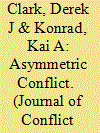

|
|
|
|
|
| Publication |
2007.
|
| Summary/Abstract |
The authors study conflict on multiple fronts. A defending player needs to successfully defend all fronts, and an attacker needs to win at only one. Multiple fronts result in a considerable disadvantage for the defending player, and even if there is a defense advantage at each of them, the payoff of the defending player is zero if the number of fronts is large. With some positive probability, in the equilibrium defending players surrender without expending effort
|
|
|
|
|
|
|
|
|
|
|
|
|
|
|
|
| 2 |
ID:
077419
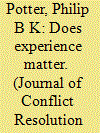

|
|
|
|
|
| Publication |
2007.
|
| Summary/Abstract |
This article demonstrates that the probability of an international crisis involving the United States declines as a presidential administration gains time in office. This finding invalidates three widely held theories about the relationship between the American democratic cycle and foreign policy that (1) there might be a honeymoon period immediately following election in which new presidents are unlikely to become involved in foreign crises, (2) presidents might systematically use the ``rally round the flag'' effect to bolster their electoral prospects, or that more generally, (3) foreign policy might be primarily tied to the democratic constraints of the electoral cycle. This finding also stands in partial contrast to recent work suggesting that, globally, leadership experience does not influence the likelihood of a militarized interstate dispute, while leader age does. The differing conclusions are the result of both the unique American case and the differing formulations of conflict
|
|
|
|
|
|
|
|
|
|
|
|
|
|
|
|
| 3 |
ID:
077420
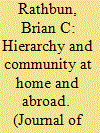

|
|
|
|
|
| Publication |
2007.
|
| Summary/Abstract |
Although there is increasing evidence of a relationship between domestic and foreign policy attitudes among American elites, we have less of an idea about why these sets of attitudes cohere. The answer lies in a better understanding of what we mean when we talk about "left" and "right" or "liberal" and "conservative." Drawing on the literature on rights theory, partisan cleavages, and ideological continua, I posit the existence of two core values, hierarchy and community, that should manifest themselves both at home and abroad. I perform a principal components analysis on data capturing both the domestic and foreign policy attitudes of American elites. The results indicate an almost identical structure of attitudes in both domains, indicating that it is generally inappropriate to distinguish between the two. Using factor scores in a series of logistic regressions, I demonstrate that support for community is most important for predicting support for humanitarian military operations, while hierarchy and community both help determine positions on strategic missions
|
|
|
|
|
|
|
|
|
|
|
|
|
|
|
|
| 4 |
ID:
077424
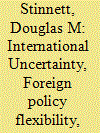

|
|
|
|
|
| Publication |
2007.
|
| Summary/Abstract |
This article explains the prevalence of surplus majority government coalitions in Israel as a result of the interaction between international uncertainty and the need to preserve both government stability and latitude in the conduct of foreign policy. I develop a game-theoretic model of government formation in which the international environment is a source of uncertainty for the policy preferences of the prime minister. The model predicts that when uncertainty is high enough, it is optimal for the prime minister to establish an oversized coalition government. By including expendable parties in a government, the prime minister has greater freedom to modify foreign policy in response to the international environment without jeopardizing majority status in parliament. The logic of the model is analyzed through two case studies: Menachem Begin, 1977-1981, and Ehud Barak, 1999-2000. The findings of the model have larger theoretical implications for the connection between domestic politics and international relations
|
|
|
|
|
|
|
|
|
|
|
|
|
|
|
|
| 5 |
ID:
077421


|
|
|
|
|
| Publication |
2007.
|
| Summary/Abstract |
This article examines the effects of personality traits on attitudes toward foreign policy issues among the German public. Building on previous research, it argues that personality characteristics shape an individual's motivation, goals, and values, thereby providing criteria to evaluate external stimuli and affecting foreign policy opinions. An analysis of survey data from a random sample of Germans eligible to vote confirms that the personality traits play a role in attitudes toward foreign policy issues. By and large, personality affects foreign policy opinions roughly as strongly as traditional factors such as partisanship, ideology, and social background. Among the traits studied, agreeableness and openness render persons more supportive of international cooperation and more skeptical of the use of military force, whereas conscientiousness exhibits reverse effects. Thus, personality traits merit serious attention in analyses of public opinion on foreign policy.
|
|
|
|
|
|
|
|
|
|
|
|
|
|
|
|
| 6 |
ID:
077422


|
|
|
|
|
| Publication |
2007.
|
| Summary/Abstract |
The long history of experimental research on the prisoner's dilemma (PD) has primarily used a methodology that eliminates cues to participants. Researchers, however, have interpreted participants' choices as cooperative or competitive. The authors' research shows that giving participants researchers' interpretive labels of the game, the choices, and the outcomes, compared to no labels, led to significantly more cooperation; labels such as trust and cooperate/defect augmented cooperation even more. A second experiment found that independent evaluations of the labels led to perceptions that were similar to individuals' choices in the first experiment. These results suggest that we might need to rethink the import of many of our previous findings and their applicability to everyday interactions
|
|
|
|
|
|
|
|
|
|
|
|
|
|
|
|
| 7 |
ID:
077425
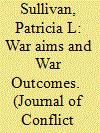

|
|
|
|
|
| Publication |
2007.
|
| Summary/Abstract |
Why are states with tremendous advantages in capabilities and resources often unable to attain even limited objectives vis-à-vis much weaker adversaries? The theory I develop focuses on how the nature of a strong state's war aims affects prewar uncertainty about the cost of victory. I argue that the relative magnitude of the effect of military strength and resolve on war outcomes varies with the nature of the object at stake and that strong states become more likely to underestimate the cost of victory as the impact of resolve increases relative to that of war-fighting capacity. I evaluate the empirical implications of this theory against the historical record provided by the universe of major power military interventions since World War II. The results challenge both existing theories and conventional wisdom about the impact of factors such as military strength, resolve, troop commitment levels, and war-fighting strategies on asymmetric war outcomes
|
|
|
|
|
|
|
|
|
|
|
|
|
|
|
|
|
|
|
|
|